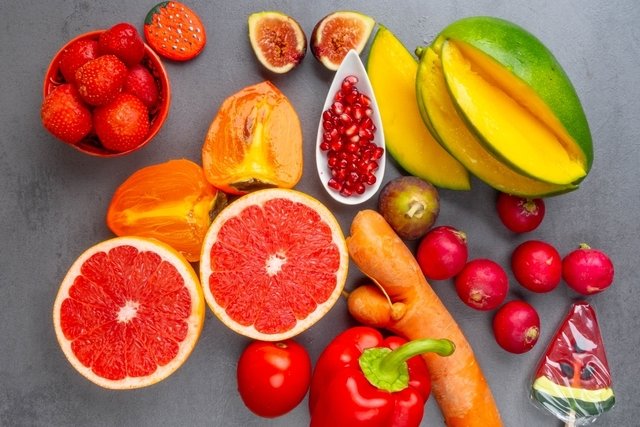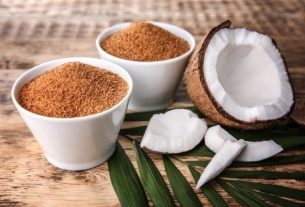Lycopene is a carotenoid pigment responsible for the red-orange color of some foods, such as tomatoes, papaya, guava and watermelon, for example. This substance has antioxidant and anti-inflammatory properties that protect the body’s cells from damage caused by free radicals, preventing oxidative stress.
Therefore, consuming foods rich in lycopene on a regular basis could help prevent the development of some types of cancer, especially prostate, breast and pancreatic cancer, as well as reducing the risk of developing diseases such as atherosclerosis and other cardiovascular diseases. .
In addition to being found naturally in food, lycopene can also be purchased in supplement form in pharmacies, health stores and online.

What is it for
Lycopene has several health benefits and can be used in several situations, the main ones being:
1. Prevent cancer
Some scientific studies have shown that regular consumption of foods rich in lycopene can help prevent some types of cancer, mainly breast, lung, ovarian, kidney, bladder, pancreas and prostate. This happens because lycopene is capable of preventing cell DNA damage from changing due to the presence of free radicals, preventing malignant transformation and the proliferation of cancerous cells.
2. Protect the body against toxic substances
Consuming lycopene regularly and in ideal quantities is capable of protecting the body against the action of pesticides and herbicides, which are toxic substances that can be ingested through food. These pesticides and herbicides are compounds used to prevent or combat pests that can cause damage during the food production process.
3. Lower your risk of heart disease
Lycopene, due to its antioxidant and anti-inflammatory action, prevents the oxidation of LDL, the “bad cholesterol”, thus preventing the formation of atherosclerosis plaques and the development of heart disease.
Furthermore, lycopene is capable of increasing the concentration of HDL, which is known as good cholesterol and promotes heart health. It could also help regulate blood pressure, as some studies indicate that lycopene reduces vasoconstriction, lowering blood pressure.
4. Protect the body against the effects of UV rays
A study was carried out with two groups of people, one who consumed 16 mg of lycopene, and the other who consumed the placebo were exposed to the sun. After 12 weeks, it was found that the group that had consumed lycopene had less severe skin lesions than those who used the placebo.
This action of lycopene can be even greater when its consumption is associated with the intake of beta-carotene and vitamins E and C.
5. Prevent premature aging
As it has antioxidant activity and regulates the amount of free radicals circulating in the body, lycopene intake helps prevent premature skin aging.
6. Prevent the development of eye diseases
It has been described in studies that lycopene helps prevent the development of eye diseases, such as cataracts and macular degeneration, preventing blindness and improving vision.
7. Prevent Alzheimer’s
Lycopene could also help prevent Alzheimer’s disease thanks to its antioxidant properties, preventing seizures and memory loss.
8. Prevent osteoporosis
Lycopene also decreases the rate of bone cell death, helping to prevent the development of osteoporosis, which is a disease characterized by decreased bone strength.
Foods rich in lycopene
The following table shows some foods that are rich in lycopene and that can be included in your daily diet:
To obtain the benefits of lycopene, it is important to maintain a balanced and healthy diet and include these foods in your daily life.
Lycopene Supplements
In addition to food, lycopene can be obtained through supplements. There is no defined daily recommendation, however, in general, a dose of 15 to 25 mg is recommended, once a day, and it is important to read the manufacturer’s recommendations, as well as consult your doctor or nutritionist before using it.
Some studies indicate that it could be more beneficial to ingest lycopene directly from its natural sources, that is, from food and not from supplementation.
Bibliography
- Burton-Freeman Britt et al. Whole Food versus Supplement: Comparing the Clinical Evidence of Tomato Intake and Lycopene Supplementation on Cardiovascular Risk Factors1,2. Advances in Nutrition. 5. 5; 457–485, 2014
- MORITZ, Bettina. Lycopene bioavailability. Rev. Nutr. Vol 19. 2 ed; 265-273, 2006
- ASCENSO, Andreia et al. The Effect of Lycopene Preexposure on UV-B-Irradiated Human Keratinocytes. Oxide With Cell Longev. 2016
- BHARDWAJ, Manveen et al. Neuroprotective Effect of Lycopene Against PTZ-induced Kindling Seizures in Mice: Possible Behavioural, Biochemical and Mitochondrial Dysfunction. Phytother Res. Vol 30. 2 ed; 306-313, 2016
- CHEN, Ping. Lycopene and Risk of Prostate Cancer: A Systematic Review and Meta-Analysis. Medicine (Baltimore). Vol 94. 33 ed; 2015
- VOUTILAINEN, Sari et al. Carotenoids and Cardiovascular Health. Am J Clin Nutr. Vol 83. 6 ed; 1265-1271, 2006
- PALOZZA, P. et al. Effect of Lycopene and Tomato Products on Cholesterol Metabolism. Ann Nutr Metab. Vol 61. 2 ed; 126-134, 2012
- ASSAR, Emelia A. et al. Lycopene Acts Through Inhibition of IκB Kinase to Suppress NF-κB Signaling in Human Prostate and Breast Cancer Cells. Tumour Biol. Vol 37. 7 ed; 9375-9385, 2016
- SAHIN, Kazim. Lycopene in the Prevention of Renal Cell Cancer in the TSC2 Mutant Eker Rat Model. Arch Biochem Biophys. 36-39, 2015
- FIEDOR, Joanna; BURDA, Kvetoslava. Potential Role of Carotenoids as Antioxidants in Human Health and Disease. Nutrients. Vol 6. 2 ed; 466-468, 2014
- YOUNG, Ioana et al. Lycopene and Vascular Health. Front Pharmacol. Vol 9. 2018
- MAHAN, L. Kathleen et al. Krause: Food, Nutrition and Diet Therapy. 13.ed. São Paulo: Elsevier Editora, 2013. 287.
- PELISSARI, Franciele Maria; RONA, Maria Stella S.; MATIOLI, Graciette. Lycopene and its contributions to disease prevention. Arq Mudi. Vol 12. 1 ed; 5-11, 2008
- JUNIOR, Hernani PL; BRUNELLI, Marcela J.; LEMOS, André Luis A. Lycopene. Diagnosis Treatment. Vol 16. 2 ed; 71-74, 2011

Sign up for our newsletter and stay up to date with exclusive news
that can transform your routine!
Warning: Undefined array key "title" in /home/storelat/public_html/wp-content/plugins/link-whisper-premium/templates/frontend/related-posts.php on line 12
Warning: Undefined array key "title_tag" in /home/storelat/public_html/wp-content/plugins/link-whisper-premium/templates/frontend/related-posts.php on line 13




